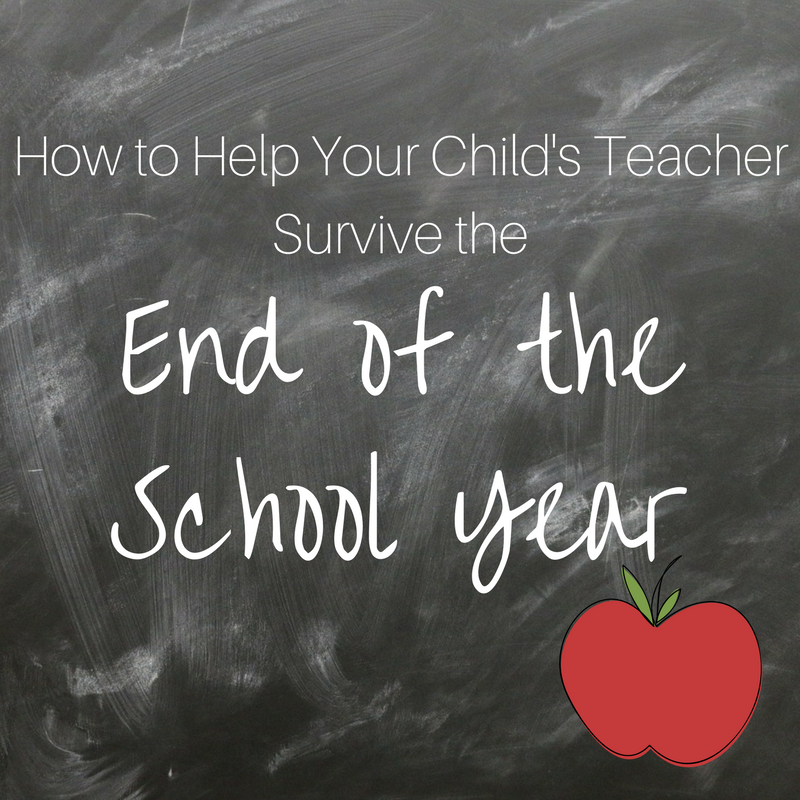It’s Teacher Appreciation Week! And while we teachers absolutely love your thoughtful words and gifts (and Starbucks gift cards), there’s one thing we appreciate the most: parents having our backs as we head into the end of the school year.
Ask any teacher, and he or she will probably shudder just thinking about it: that end of the school year energy. It starts right after Spring Break.
Unlocking my classroom door that first morning back, I tepidly peeked my head inside. I was nervous, as if a neon sign might have appeared announcing the end of civility and procedures I had worked so hard to implement. Of course, nothing much had changed aside from pesky posters that had fallen to the floor. Still, there was something in the air … something I could sense as soon as students began filling up the courtyard that morning.
You can’t escape it. There’s no use trying. That morning after Spring Break, it swept across campus, striking fear in the hearts of myself and my colleagues, while putting a pep in the step of each student. It’s the age-old battle between young and old(er). It’s the annual showdown between classroom goals and the pull of the pool. In short, it’s stressful.
The good news is that you, the parent, can help ensure everyone survives the end of the school year battle with the help of four simple steps! And while I work with middle schoolers, most of these ideas can easily be incorporated into other age-ranges, as well.
1.) During the End of the School Year, Maintain High Standards
One of the biggest issues with the end of the year is that students tend to feel less responsible for their work. As summer approaches, it can become easy to slip from accomplished to apathetic and, while the temptation is understandable, the results are usually regrettable.
Help your child by keeping your focus on academic priorities. Stay engaged. Continue checking grades if you have online access to them. Ask questions about schoolwork. Show an active interest in new lessons and projects. More than anything do not give up on your child.
Does it seems as though he has dug himself into too deep a hole from which to recover? The desired grade may, indeed, be out of reach but that presents a fantastic learning opportunity. Have him complete and turn in every missing assignment, regardless of whether it will still be accepted for credit. Whatever methods you choose, maintaining high standards up to the very last day helps teach your child the importance of perseverance while preventing us from crying into our keyboards while inputting grades.
2.) Implement a “Sink-or-Swim” Mentality
The end of the year is chock-full of events and activities outside our already jam-packed schedules. We simply don’t have time for countless emails pouring in from parents trying to save their child’s grade at the last minute. Of course, we welcome communication and want to be available to you, but the idea that there is a magic fix we can implement is extremely frustrating, especially if we have repeatedly tried to initiate contact throughout the year.

As a mother myself, I fully understand the desire to protect your child. It’s hard to imagine he or she being devastated by poor grades or being excluded from walking in a promotion ceremony as a result of those grades. It’s important to remember, though, that these experiences are vital and provide the foundation upon which your student will approach high school—a time fraught with far more impactful consequences for their academic choices.
I believe it is especially crucial for a middle schooler to learn that Mom can’t always clean up his messes. Give him the tools he needs to succeed but then step aside. He might fail. He might have to fail. But hopefully the lesson will stick, and you will both be better for it.
For our part, well, it takes a huge weight off our shoulders when we are validated as educators instead of expected to be miracle workers. That’s a lot to handle with a single 50 minute planning period each day!
3.) Participate in End of the School Year Activities
Many schools do their best to reward students for positive behavior and/or academic success with activities like field trips, dances, carnivals, and spirit weeks. It helps keep them motivated through the remainder of the school year and is usually well-deserved.
Still, as a parent, all the various activities can feel overwhelming, especially if you have more than one child. There’s scheduling, expense, and the dreaded call for volunteers. It’s understandable if chaperoning middle schoolers isn’t your ideal way to use a personal day, but it means a lot to them … and us.
Most days, I am busy pushing my students to be the best versions of themselves. I hold them to high standards, pull them out of their comfort zones, and encourage the kind of critical thinking that takes energy and effort. So I am truly grateful when I get to see them smiling and carefree, away from the rigors of academics. Without you, such activities simply wouldn’t happen.
4.) Say “Thank You”
It sounds simple enough, and it is! Teaching can sometimes feel like a thankless job, leaving one physically and emotionally exhausted. Chances are, as the school year winds to a close, your child’s teacher will be more than ready for summer break—just like your student. And while mugs, gift cards, and candy are thoughtful, what we really appreciate is a simple ‘thank you.’ Whether said in passing, written in an email, or passed along in a handwritten note, rest assured that the sentiment is fully appreciated. It’s what sustains us through the challenging seasons of this career and keeps us fighting the good fight for your kids.

Because while the end-of-year battle might be inevitable, the chance that it diminishes our love for the job is not. With a little bit of help from you, we’ll not only survive but we’ll show up on the first day next year ready for whatever challenges await!











